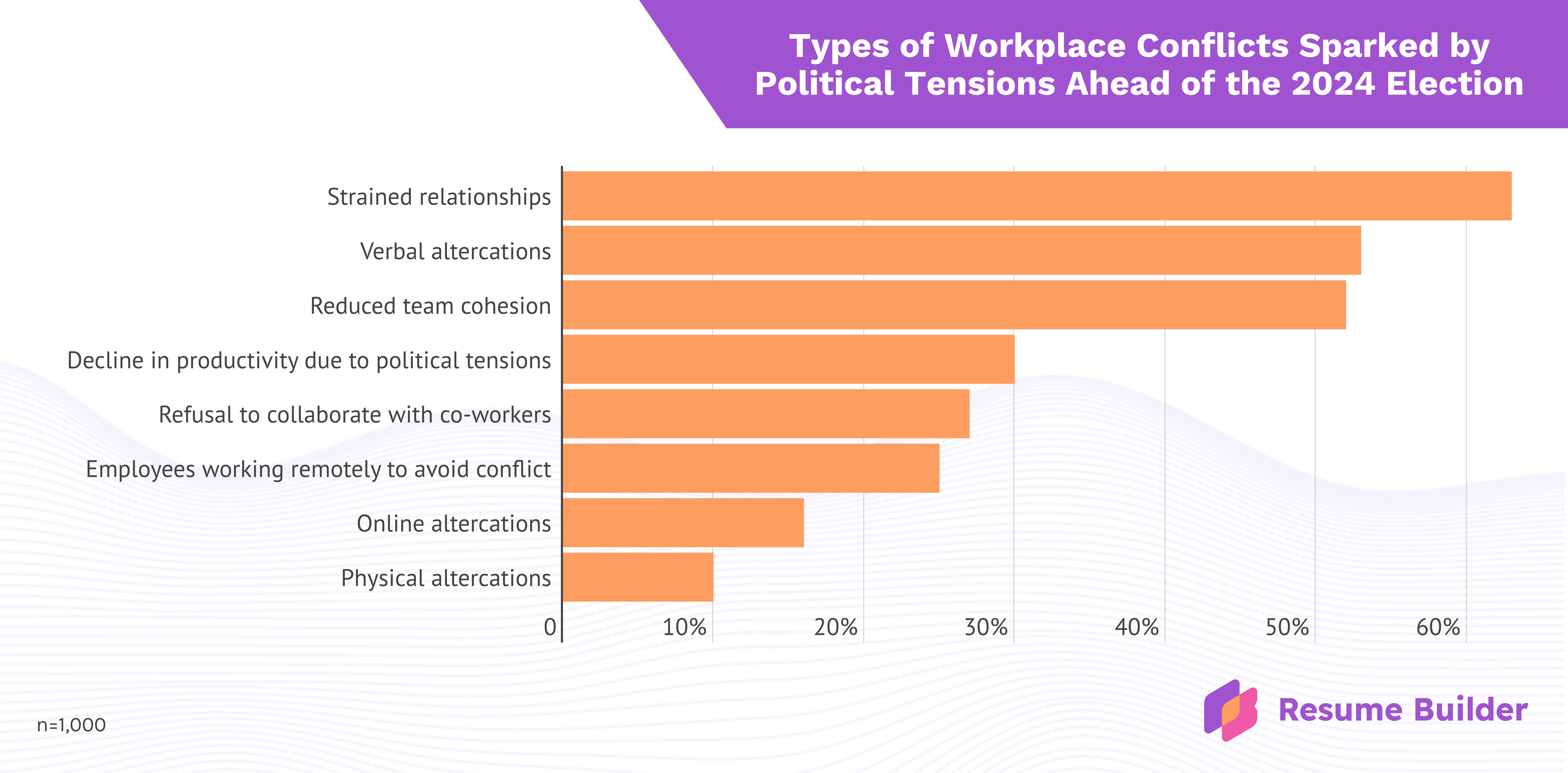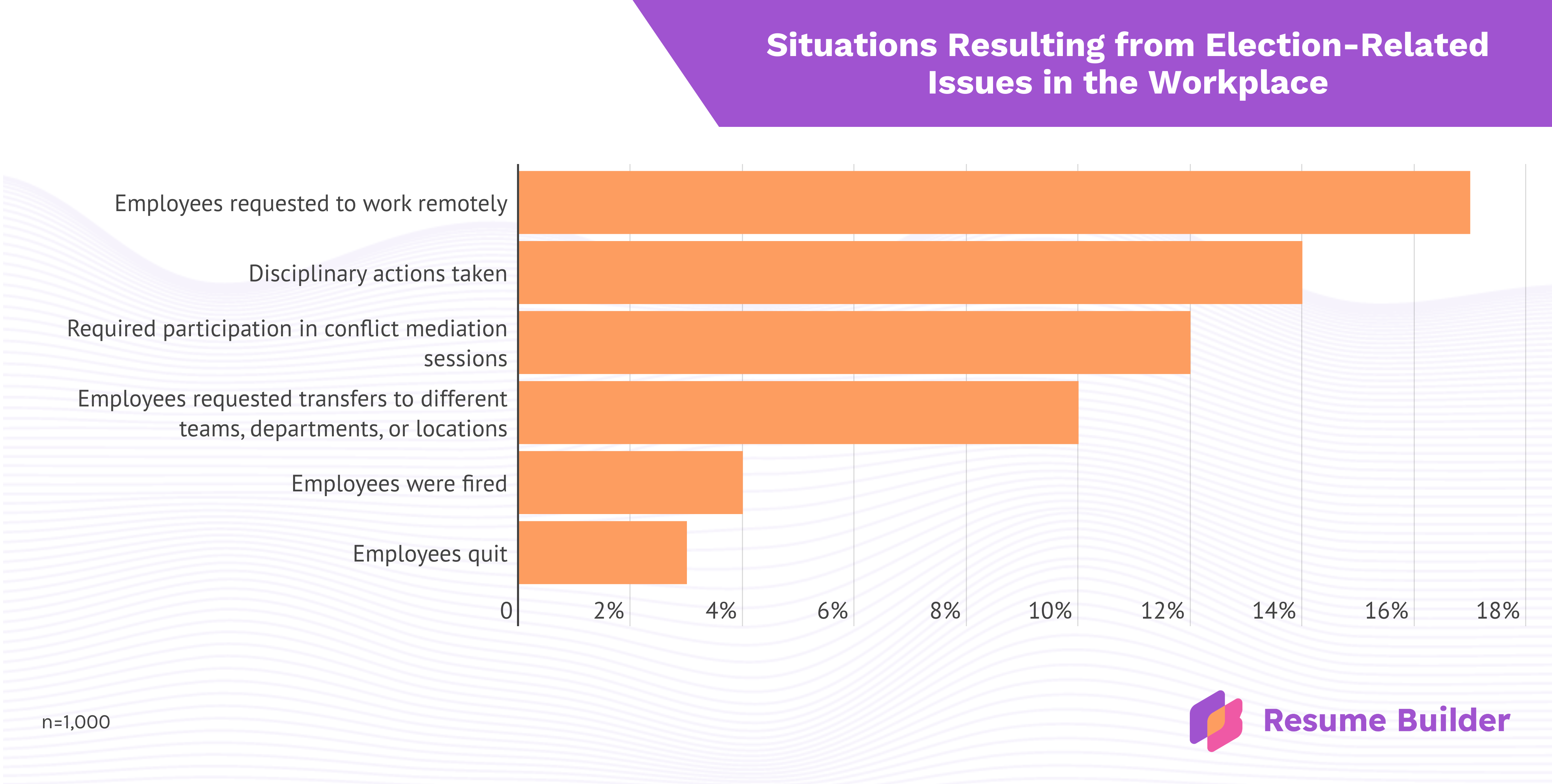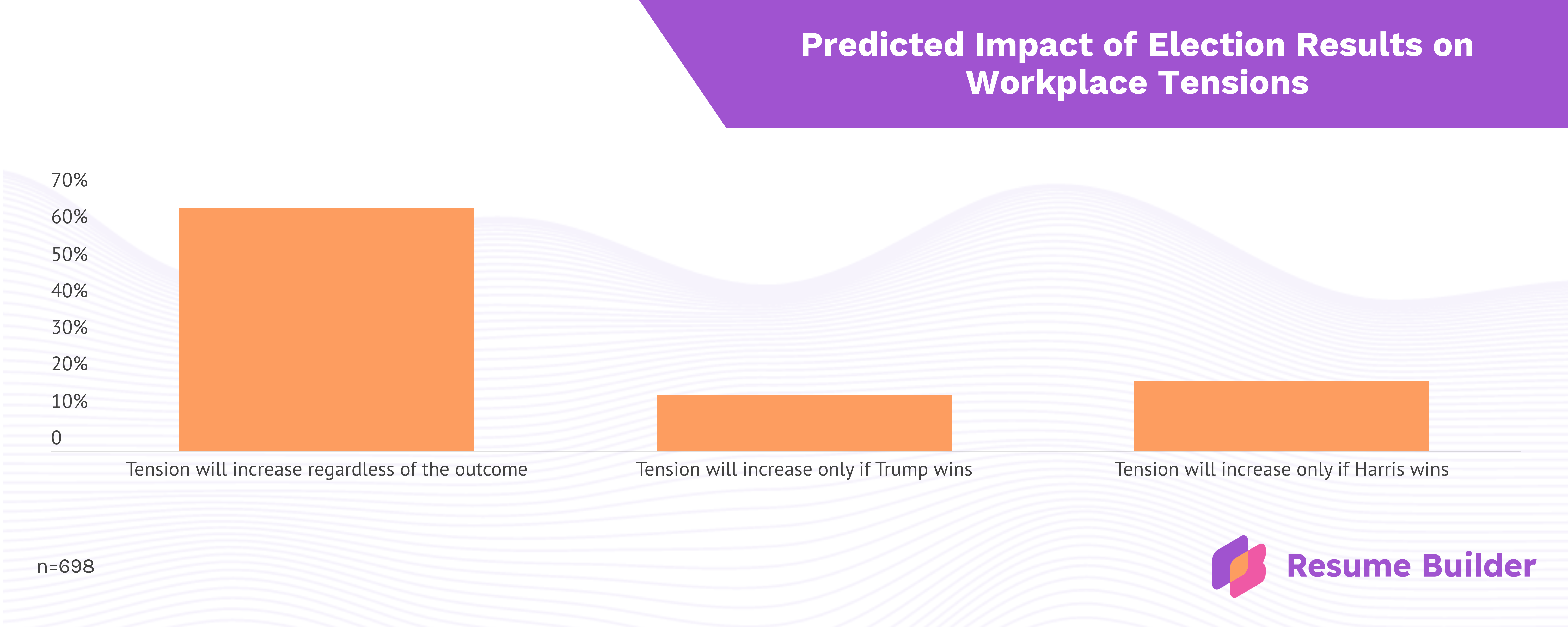With the 2024 Presidential Election just a week away, some employers are struggling to navigate the heightened political tensions that have entered the workplace.
In October, ResumeBuilder.com conducted a survey of 1,000 U.S. managers to gain insights into how the election cycle has affected the work environment.
Key findings:
- 27% of managers report the presidential election has caused conflict among employees
- 38% say the election has decreased morale and productivity
- 70% fear tensions will escalate post-election
- 4 in 10 will have employees work remotely election week
3 in 10 Managers Say the Upcoming Election Has Caused Conflict in the Workplace
As the 2024 presidential election approaches, political tensions are spilling over into the workplace. Nearly three in 10 (27%) managers say the upcoming election has caused conflicts among employees.
Managers report that these political conflicts have manifested in various ways, with the most common issues including strained relationships (63%), verbal altercations (53%), and a decrease in team cohesion (52%). The impact on productivity is notable as well, with 30% of managers observing that political disagreements are distracting employees and reducing overall output. In addition, around 27% of employees say they refuse to collaborate with coworkers holding different political views, while 25% report working remotely as a way to avoid potential conflicts.

In response to political tensions from the upcoming presidential election, the most common situations include employees requesting to work from home (17%) and facing disciplinary action (14%). Additionally, 12% of managers say employees have been mandated to attend conflict mediation with HR, while 10% report employees requesting transfers to other teams or departments. A smaller percentage of companies experienced employees being fired (4%) or quitting (3%) due to election-related issues.

“Political conflicts can easily disrupt workplace harmony,” says Resume Builder’s Chief Career Advisor Stacie Haller. “Employees need reassurance that their diverse perspectives will be respected. HR has the challenging responsibility of managing political tensions, ensuring respect, and fostering a workplace where all team members feel valued. There is a need for workplaces to maintain a neutral environment.”
4 in 10 believe political tensions have impacted morale and productivity
Nearly four in ten (38%) of managers believe political tensions and conflicts have definitely (12%) or probably (26%) impacted morale and productivity. On the other hand, 51% feel they have probably not (26%) or definitely not (25%), while 12% are unsure.
“Almost half of managers have witnessed workplace political disagreements,” says Adam Wood co-founder of RevenueGeeks. “However, our team meetings are focused on teamwork and business goals, which helps us stay together. Emphasizing mutual respect and transparent communication allows us to navigate conflicts and create a cohesive workplace culture. We establish a friendly environment where employees can express their concerns and ideas. A diverse workplace, where all employees feel appreciated and respected regardless of their political affiliation, is important.”
To reduce conflict, 3 in 10 companies have barred political discussions in the workplace
To prevent or manage political tension among employees, 32% of companies have banned politically-affiliated posters, merchandise, or apparel in the workplace, while 27% have banned political discussions. Additionally, 20% are offering counseling or support services, and 13% have hosted conflict mediation sessions to improve employee relationships.
Tetiana Hnatiuk, head of HR at Skylum discusses the steps the company has taken to mitigate challenges.
“We value discipline and professionalism and understand how heated discussions or lack of acceptance of others’ worldviews can affect team dynamics and even productivity,” says Hnatiuk. “While it’s impossible to avoid conflicts based on political disagreements altogether, it’s important that when those conflicts arise they’re handled appropriately. During this election period, I check more often on our team members, and remind them they can schedule one-on-one meetings with me.”
7 in 10 Managers Are Worried Workplace Tension Will Be Worse After the Election
A majority of managers (70%) are concerned that political tensions and conflicts will escalate after the election, with 26% being very concerned and 44% somewhat concerned. Meanwhile, 23% are not very (16%) or not at all concerned (7%), and 7% are unsure.
Most managers (66%) believe that political tension and conflict will escalate regardless of the election outcome. In contrast, 15% think escalation will occur only if Trump wins, while 19% believe it will happen only if Harris wins.

4 in 10 companies are having employees work remotely election week
About 36% of companies are likely to implement a remote work policy during election week (17% definitely, 20% probably), while 51% are unlikely to do so. An additional 6% are already fully remote, and 7% are unsure if the company will implement such a policy.
Companies implementing remote work during the election week mainly aim to provide flexibility for voting (79%). Other common reasons include reducing workplace stress and tension (47%), avoiding conflicts between employees with differing political views (34%), ensuring safety from potential external unrest (34%), and boosting employee morale (39%).
“As the election approaches, HR teams should plan for how they will respond in its aftermath, as many anticipate tensions will persist or even intensify. Setting expectations and establishing guidelines for appropriate workplace conduct is more important than ever, as organizations navigate this highly charged period. Planning now will be essential to supporting a respectful, cohesive workplace,” says Haller.
Methodology
This survey, launched on October 24, 2024, was commissioned by ResumeBuilder.com and conducted online by the polling platform Pollfish. Overall, 1,000 U.S. full-time manager-level workers completed the survey.
To qualify for the survey, all participants had to be over 25, have a household income of at least $75,000, have an associate’s degree or a higher level of education, have a manager-level role or higher, and work at a company with more than 11 employees.Respondents also had to indicate their level of knowledge about current and future policies at their company via a screening question.
For all media inquiries, contact [email protected].
